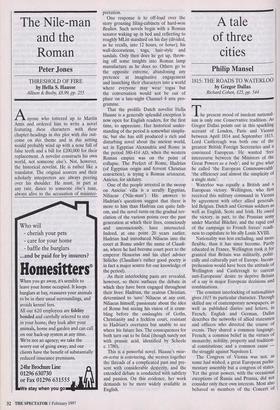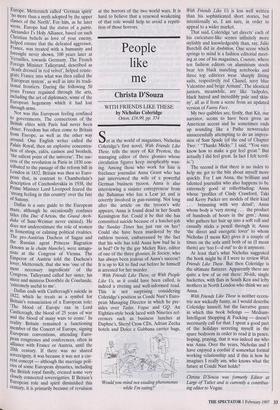A tale of three cities
Philip Mansel
1815: THE ROADS TO WATERLOO by Gregor Dallas Richard Cohen, £25, pp. 544 The present mood of insolent national- ism is only one Conservative tradition. As Gregor Dallas points out in this sparkling account of London, Paris and Vienna between April 1814 and September 1815, Lord Castlereagh was both one of the greatest British Foreign Secretaries and a convinced European. He wanted 'free intercourse between the Ministers of the Great Powers as a body'; and to give what he called 'the European Commonwealth' `the efficiency and almost the simplicity of a single state'.
Waterloo was equally a British and a European victory. Wellington, who first received this military command in Vienna by agreement with other allied generals, led Belgian, Dutch and German soldiers as well as English, Scots and Irish. He owed the victory, in part, to the Prussian army under Marshal Bliicher, and the rapid end of the campaign to French forces' readi- ness to capitulate to his ally Louis XVIII.
Nationality was less excluding, and more flexible, than it has since become. Partly educated in France, Wellington took it for granted that Britain was militarily, politi- cally and culturally part of Europe. Incom- prehension would have been the attitude of Wellington and Castlereagh to current anti-Europeans' desire to deprive Britain of a say in major European decisions and combinations.
The constant interlocking of nationalities gives 1815 its particular character. Through skilled use of contemporary newspapers, as well as published diaries and letters, in French, English and German, Dallas describes the networks of allied statesmen and officers who directed the course of events. They shared a common language, French; a common belief in the virtues of monarchy, nobility, property and tradition- al constitutions; and a common cause the struggle against Napoleon I.
The Congress of Vienna was not, as some had wished, a great European parlia- mentary assembly but a congress of states. Yet the great powers, with the occasional exceptions of Russia and Prussia, did not consider only their own interests. Most also behaved as members of the Concert of Europe. Metternich called 'German spirit' no more than a myth adopted by the upper classes of the North'. For him, as he later wrote, Europe had the status of a patrie. Alexander I's Holy Alliance, based on such Christian beliefs as love of your enemy, helped ensure that the defeated aggressor, Prance, was treated with a humanity and foresight never shown, 100 years later at Versailles, towards Germany. The French Foreign Minister Talleyrand, described as death dressed in red velvet', helped reinte- grate France into what was then called the European system', as well as into its tradi- tional frontiers. During the following 50 years France regained through the arts, Including the art of diplomacy, some of the European hegemony which it had lost through arms. Nor was this European feeling confined to governments. The connections of the British elites with Paris had never been closer. Freedom has often come to Britain from Europe, as well as the other way around. One English writer called the Palais Royal, then an explosive concentra- tion of shops, cafés, casinos and brothels, the salient point of the universe'. The suc- cess of the revolution in Paris in 1830 con- tributed to the passage of the reform bill in London in 1832. Britain was then so Euro- pean that, in contrast to Chamberlain's description of Czechoslovakia in 1938, the Prime Minister Lord Liverpool feared the strong feeling in this country' over the fate of Saxony. Dallas is a sure guide to the European maze, although he occasionally confuses titles (the Duc d'Artois, the Grand Arch- duke of Saxe-Weimar never existed). He does not underestimate the role of women in fomenting or calming political rivalries. The pro-Austrian Duchess of Sagan and the Russian agent Princess Bagration (known as la chatte blanche), were antago- nists at the Congress of Vienna. The Emperor of Austria told the Duchess's lover, Metternich, that she was 'one of the Most necessary ingredients' of the Congress. Talleyrand called her sister, his niece and mistress Dorothde de Courlande, extremely useful to me'. Dallas ends with Castlereagh's suicide in 1822, which he treats as a symbol for Britain's renunciation of a European role: The blood of Europe ran in Lord Castlereagh, the blood of 25 years of war and the blood of many wars to come.' In reality Britain remained a functioning member of the Concert of Europe, signing European conventions, attending Euro- pean congresses and conferences, often in alliance with France or Austria, until the 20th century. If there was no shared sovereignty, it was because it was not a cur- rent concept — although the marriage poli- cies of some European dynasties, including the British royal family, created some very closely connected sovereignties. If Britain's European role and spirit diminished this century, it is primarily because of revulsion at the horrors of the two world wars. It is hard to believe that a renewed weakening of that role would help to avoid a repeti- tion of those horrors.



























































 Previous page
Previous page